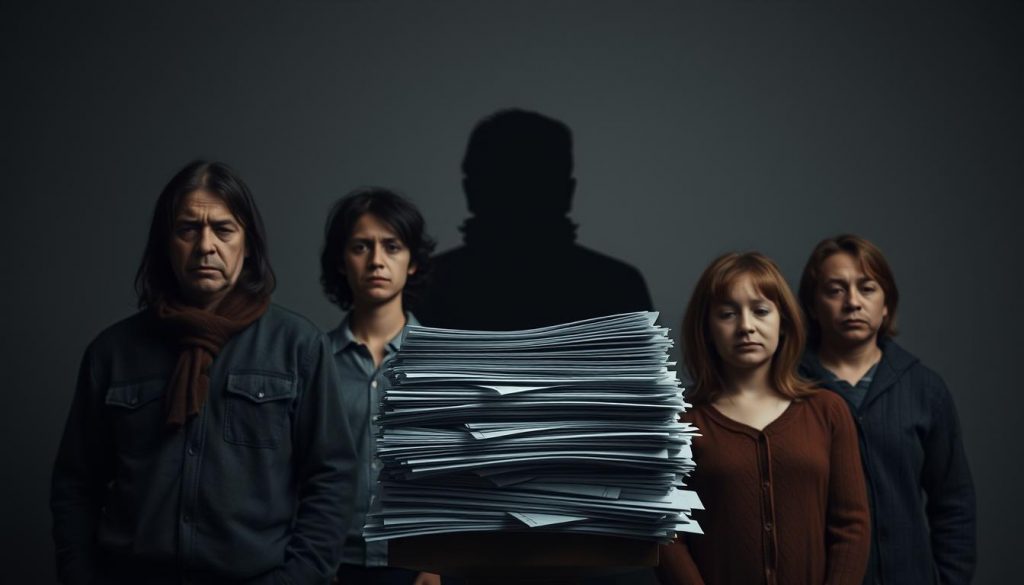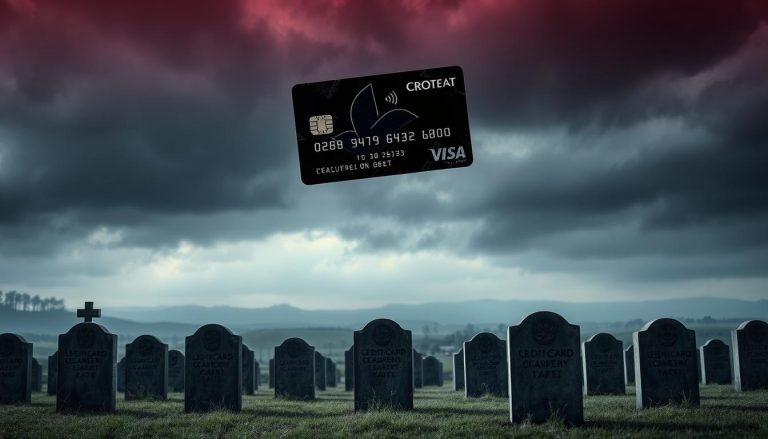Dealing with the financial affairs of a loved one who has passed away can be challenging. One of the concerns is what happens to their credit card debt. In the UK, this type of debt is treated as part of the deceased’s estate, which includes all their money, property, and belongings.
When someone dies, their debts are paid from their estate. You’re only responsible for their debts if you had a joint loan or agreement or provided a loan guarantee. We understand that this can be a complex and emotional time, and we’re here to guide you through the process.
Understanding how credit card debt responsibility works can help you manage the financial affairs of your loved one. We’ll explore this topic further to provide clarity and support during this difficult time.
Key Takeaways
- Credit card debt is paid from the deceased’s estate in the UK.
- You are not responsible for the debt unless you had a joint agreement or provided a guarantee.
- Understanding the rules around posthumous credit card debt can help you manage the estate.
- It’s essential to seek professional advice when dealing with the financial affairs of a deceased loved one.
- The estate includes all the money, property, and belongings of the deceased.
Understanding Credit Card Debt in the UK
Understanding credit card debt is crucial for managing personal finances effectively in the UK. Credit card debt is a common financial tool used by many, but it can quickly become a significant financial burden if not managed properly.
To grasp what happens to credit card debt after death, it’s essential to understand how credit card debt works in the first place. We will break down the definition of credit card debt and explain how it is managed during a person’s lifetime.
Definition of Credit Card Debt
Credit card debt is a type of unsecured debt, meaning it’s not tied to a specific asset like a house or car. When you use a credit card, you’re essentially borrowing money from the card issuer. This type of debt is considered unsecured because there’s no collateral backing the loan.
Key characteristics of credit card debt include:
- Unsecured loan: No collateral is required.
- Variable interest rates: Interest rates can fluctuate.
- Revolving credit: You can reuse the credit limit as you pay off the balance.
How Credit Card Debt Works
Credit card debt works on a revolving credit system. When you make a purchase using a credit card, the amount is added to your outstanding balance. You’re required to make a minimum payment each month, and interest is charged on the remaining balance if it’s not paid in full.
The process can be summarized as follows:
- You receive a credit card with a specified limit.
- You make purchases up to that limit.
- Each month, you’re required to make a minimum payment.
- Interest is charged on the remaining balance if not paid in full.
Here’s an example to illustrate how credit card debt can accumulate:
| Initial Balance | Monthly Purchase | Minimum Payment | Interest Rate | Balance After 1 Month |
|---|---|---|---|---|
| £0 | £500 | £25 | 20% | £483.33 |
| £483.33 | £200 | £30 | 20% | £663.33 |
As shown in the table, if you continue to make purchases and only pay the minimum payment, your debt can quickly escalate due to the compounding interest.

Understanding these mechanics is vital for managing credit card debt effectively. In the next section, we will explore what happens to this debt upon death.
What Happens to Debt Upon Death?
Upon passing, a person’s debts are addressed through a specific legal process. When someone dies, their financial responsibilities don’t just disappear; instead, they are managed through their estate. This process ensures that debts are settled before any inheritance is distributed.
Overview of Debt Responsibilities
When a person dies, their debts become the responsibility of their estate. The estate includes all the assets, such as property, money, and possessions, owned by the deceased. Debts are typically paid from the estate before any remaining assets are distributed to beneficiaries or heirs. This means that the executor of the estate plays a crucial role in managing and settling these debts.
The process involves identifying all debts, prioritizing them according to legal guidelines, and then settling them using the assets from the estate. It’s essential to understand that not all debts are treated equally; some may have higher priority than others.

Legislation Governing Debt After Death
The legislation governing debt after death varies, but in the UK, it is primarily guided by the Administration of Estates Act 1925. This act outlines how the estate should be administered, including the payment of debts. According to this legislation, debts are paid in a specific order, with secured debts typically being addressed before unsecured ones.
Understanding the legal framework is crucial for executors and beneficiaries to navigate the process of settling the deceased’s debts. It’s also important to note that while the estate is responsible for the debts, there are instances where others might be held responsible, such as joint account holders.
Who Is Responsible for the Debt?
Understanding who is responsible for a deceased person’s credit card debt is crucial for those dealing with the aftermath.
When a person dies, their debts do not simply disappear. Instead, these debts become the responsibility of their estate. The estate is made up of the deceased person’s assets, including property, money, and other possessions. It’s essential to understand how the estate’s assets are used to settle outstanding debts.
The Role of the Estate
The estate plays a central role in settling the deceased person’s debts. The executor, or personal representative, is tasked with managing the estate’s assets and liabilities. This includes using the estate’s assets to pay off creditors, including credit card companies.
The order in which debts are paid can vary, but typically, funeral expenses and taxes are prioritized first. Credit card debt is usually considered an unsecured debt and is addressed after secured debts and essential expenses have been covered.
Executor Responsibilities
The executor is responsible for managing the estate in accordance with the deceased person’s will or, if there is no will, according to the laws of intestacy in the relevant UK jurisdiction. This includes:
- Identifying and gathering the deceased person’s assets
- Paying off debts and taxes
- Distributing the remaining assets to beneficiaries
It’s crucial for the executor to keep detailed records of all transactions and communications with creditors. This helps ensure transparency and can protect the executor from potential liability.
Joint Account Holders
If the deceased person had joint credit card accounts or loans, the surviving account holders become responsible for the full amount of the debt. This is because joint accounts are considered a shared liability.
It’s essential for individuals with joint accounts to understand that they will be liable for the entire debt upon the other account holder’s death. They should be prepared to either pay off the debt or negotiate with the creditor.
In summary, the responsibility for credit card debt after death in the UK primarily falls on the estate. Executors play a key role in managing this process, and joint account holders become liable for the full amount of joint debts.
Types of Debt Affected by Death
When someone passes away, their debts don’t simply disappear; understanding the types of debt affected by death is crucial. Different debts are treated differently upon death, and knowing how they are handled can help families and executors manage the deceased’s financial obligations more effectively.
Secured vs. Unsecured Debt
Debts can be broadly categorized into secured and unsecured debt. Secured debt is tied to a specific asset, such as a mortgage on a house or a car loan. If the debt is not paid, the creditor has the right to repossess the asset. On the other hand, unsecured debt is not linked to any specific asset. Credit card debt is a common example of unsecured debt. Understanding the distinction between these two types of debt is vital when dealing with the estate of the deceased.
Upon death, secured debts are typically settled by selling the associated asset. For instance, if the deceased had a mortgage, the house may be sold to pay off the mortgage. Unsecured debts, like credit card debt, are handled differently. They are paid from the estate’s assets, but only after secured debts and certain priority debts (like funeral expenses) have been settled.

Differences Between Personal Loans and Credit Cards
Both personal loans and credit cards are forms of borrowing, but they have distinct characteristics. Personal loans can be either secured or unsecured, depending on the terms agreed upon with the lender. They typically involve borrowing a lump sum that is repaid over a fixed period.
Credit cards, on the other hand, represent a form of revolving credit, where the borrower can draw funds up to a certain limit, repay them, and then draw them again. Credit card debt is usually unsecured. The key difference between personal loans and credit cards lies in their structure and flexibility. Personal loans offer a fixed repayment schedule, whereas credit cards require a minimum payment each month, with the flexibility to pay more or less (subject to the minimum payment requirement).
When managing the estate, it’s essential to differentiate between these types of debts to prioritize payments correctly. Unsecured debts like credit card balances are typically paid after secured debts, in accordance with the estate’s administration rules.
Impact on Family Members
When a loved one passes away, their debts don’t simply disappear, leaving family members to navigate a complex financial situation. It’s essential to understand how credit card debt and other financial obligations can affect those left behind.
Liability of Family Members
In the UK, family members are generally not automatically responsible for a deceased relative’s debts unless they were joint account holders or had provided a guarantee. You are not automatically responsible for a husband’s, wife’s, or civil partner’s debts. However, if you had a joint loan or agreement, you will be liable for the debt.
To clarify the circumstances under which family members might be liable, consider the following scenarios:
- If you were a joint account holder on a credit card or loan, you are responsible for the debt.
- If you provided a guarantee for a loan, you may be liable for the debt.
- If you inherited assets from the deceased’s estate, you are not personally liable for their debts, but the estate’s assets may be used to settle the debts.
Inheritance and Debt
The presence of debt can significantly impact the inheritance received by family members. When a person dies, their estate (including all assets, properties, and possessions) is used to settle their outstanding debts. Only after the debts are cleared can the remaining assets be distributed according to the will or the rules of intestacy.
Here’s an example of how debt can affect inheritance:
| Scenario | Estate Value | Debt | Inheritance |
|---|---|---|---|
| No Debt | £100,000 | £0 | £100,000 |
| With Debt | £100,000 | £30,000 | £70,000 |
As illustrated, the presence of £30,000 in debt reduces the inheritance from £100,000 to £70,000.

Understanding the implications of a loved one’s debt on family members is crucial for managing expectations and planning for the future. By knowing how debts are handled and the potential impact on inheritance, families can better navigate the challenges that come with the loss of a loved one.
The Role of the Executor
The executor is a vital figure in managing the deceased’s estate, ensuring that debts are paid and assets are distributed according to the will. This role is crucial in handling the financial affairs of the deceased, providing a clear and structured approach to settling their estate.
Responsibilities of the Executor
The executor’s responsibilities are multifaceted, involving both the management of the estate’s assets and the settlement of outstanding debts. Some of the key tasks include:
- Identifying and valuing the assets of the estate
- Paying off debts and liabilities
- Distributing the remaining assets according to the will
- Dealing with tax authorities and filing tax returns
It’s essential for the executor to keep detailed records of all transactions and communications related to the estate. This not only helps in managing the estate efficiently but also provides transparency and accountability.
Managing the Deceased’s Estate
Managing the deceased’s estate involves a thorough understanding of the estate’s composition, including its assets, liabilities, and potential income. The executor must:
| Task | Description |
|---|---|
| Asset Valuation | Determining the value of the estate’s assets, such as property, investments, and personal belongings. |
| Debt Settlement | Paying off outstanding debts, including credit card debt, loans, and other liabilities. |
| Asset Distribution | Distributing the remaining assets to beneficiaries according to the will. |
By following these steps, the executor can ensure that the estate is managed effectively, and the deceased’s wishes are respected.

We understand that managing a deceased’s estate can be challenging, but with the right guidance, executors can navigate this complex process with confidence.
Options for Settling Credit Card Debt
Managing credit card debt after someone has passed away requires a clear understanding of the available options and the legal framework governing debt inheritance in the UK. When a person dies, their debts don’t simply disappear; instead, they become the responsibility of their estate.
Payment from the Estate
In the UK, debts are paid from the estate before any inheritance is distributed. This means that the executor of the estate will need to settle the credit card debt using the assets from the estate. If there’s not enough money in the estate to cover all debts, they are paid in a specific order as dictated by UK law. For instance, funeral expenses and taxes are typically prioritized over credit card debt. It’s essential to understand this hierarchy to manage expectations and make informed decisions.
For more detailed information on how debts are handled when someone dies, you can visit the NIDirect government website, which provides comprehensive guidance on the process.
Negotiating with Creditors
In some cases, it may be possible to negotiate with creditors to reduce the amount of debt owed. This can be a complex process and may require professional advice. Creditors may be willing to accept a reduced payment if it’s clear that the estate cannot cover the full amount. However, this is not always the case, and the decision to negotiate should be made with careful consideration of the potential outcomes.
Executors should keep detailed records of all communications with creditors and seek legal advice if necessary to ensure that they are acting in accordance with their duties and UK law.
Dealing with Creditors Post-Death
Managing the financial affairs of a deceased family member involves several crucial steps, including dealing with creditors. When someone passes away, their debts don’t simply vanish; they need to be addressed as part of settling their estate. This process can be challenging, but understanding the steps involved can make it more manageable.
Contacting Creditors
The first step in dealing with creditors is to notify them of the individual’s passing. This is a critical task as it informs the creditors that the account holder is deceased and that the debt will be handled according to their estate’s instructions. It’s essential to contact creditors promptly to avoid any further debt accumulation or potential legal issues. You can usually find the contact information for creditors on the credit card statements or through the creditor’s website.
When contacting creditors, be prepared to provide necessary information, including the death certificate and proof of your authority to act on behalf of the estate. This may involve providing documentation such as a grant of probate or letters of administration, depending on the jurisdiction and the creditor’s requirements.
“It’s crucial to keep detailed records of all communications with creditors, including dates, times, and the names of individuals spoken to.”
Documentation Required
To effectively deal with creditors, you’ll need to provide specific documentation. The primary document required is the death certificate, which serves as proof of the account holder’s passing. Additionally, creditors may request:
- Proof of identity of the person dealing with the estate
- Documentation showing authority to act on behalf of the estate (e.g., grant of probate)
- Details of the estate’s assets and liabilities
Ensuring you have these documents ready can streamline the process of dealing with creditors and help avoid unnecessary delays.
By understanding the process of contacting creditors and the necessary documentation required, you can more effectively manage the deceased’s credit card debt and other financial obligations. This not only helps in settling the estate but also in reducing the stress associated with dealing with the deceased’s financial affairs.
Conclusion: Key Takeaways on Credit Card Debt After Death
Understanding the fate of credit card debt after death is crucial for those left behind to manage the deceased’s estate effectively. When someone passes away, their financial obligations don’t simply disappear. In the UK, the rules surrounding credit card debt after death can be complex, involving the estate, executors, and potentially family members.
Final Thoughts
It’s essential to grasp that credit card debt is considered an unsecured debt, meaning it’s not tied to a specific asset like a house or car. The responsibility for settling this debt typically falls to the deceased’s estate. If the estate lacks sufficient funds, the debt may remain unpaid, but this doesn’t automatically transfer the liability to family members or heirs.
Key points to remember:
- The estate is primarily responsible for settling credit card debt.
- Executors play a crucial role in managing the estate’s assets and liabilities.
- Family members are generally not liable for the deceased’s credit card debt unless they were joint account holders or provided a guarantee.
Resources for Further Information
For those navigating the complexities of credit card debt after death, several resources are available:
- Citizens Advice: Offers guidance on dealing with debt after someone has died.
- The UK Government’s Website: Provides information on the probate process and handling the deceased’s estate.
- StepChange Debt Charity: A charity that provides free debt advice, including situations involving deceased estates.
Dealing with credit card debt after a loved one’s passing can be challenging, but with the right information and support, it’s manageable. By understanding the process and knowing where to seek help, you can navigate this difficult time more effectively.
Frequently Asked Questions (FAQs)
Understanding the intricacies of credit card debt after death can be challenging. We address some of the most common questions to provide clarity on this complex issue.
Common Queries
Many individuals are unsure about their liability regarding the deceased’s credit card debt. According to UK credit card debt inheritance laws, family members are generally not responsible for the debt unless they were joint account holders or guarantors.
When a person dies, their estate is responsible for clearing debts after death, including credit card debt. The executor of the estate manages this process, which involves paying off debts from the deceased’s assets before distributing any remaining inheritance.
Resources for Assistance
If you’re dealing with the estate of a deceased loved one and need guidance on managing their credit card debt, several resources are available. Citizens Advice and the UK Government’s website offer valuable information on handling debt after death.
For personalized advice, consider consulting a financial advisor or solicitor specializing in estate management. They can provide tailored guidance to help you navigate the complexities of UK credit card debt inheritance laws and ensure that you’re taking the right steps in clearing debts after death.


